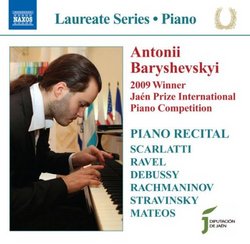| All Artists: Antonii Baryshevskyi, Scarlatti, Ravel, Debussy Title: Piano Recital Members Wishing: 0 Total Copies: 0 Label: Naxos Original Release Date: 1/1/2010 Re-Release Date: 5/25/2010 Genre: Classical Styles: Historical Periods, Classical (c.1770-1830) Number of Discs: 1 SwapaCD Credits: 1 UPC: 747313257379 |
Search - Antonii Baryshevskyi, Scarlatti, Ravel :: Piano Recital
 | Antonii Baryshevskyi, Scarlatti, Ravel Piano Recital Genre: Classical
|
Larger Image |
CD Details |
CD ReviewsWhere Do These Wonderful but Unknown Pianists Come From? J Scott Morrison | Middlebury VT, USA | 06/27/2010 (5 out of 5 stars) "Like most of you, I'd never heard of Antonii Baryshevskyi. He's a Ukrainian pianist who is barely out of conservatory but who is a seasoned international piano competition winner. This disc was obviously sponsored by a competition that he won in 2009 -- the Prémio Jaén de Piano -- and was recorded in the conservatory in that south central Spanish city. One might wonder, then, if this is a vanity project. And to some extent, of course, it is. But that doesn't negate the fact that this young pianist really has the goods -- technique, musicianship, poetry.
The program of this recital ranges from sonatas of Domenico Scarlatti to a new piece written for the Jaén competition by Spanish composer Daniel Mateos, a virtuosic but otherwise negligible work called 'Orion.' I was immediately struck by the crystalline beauty of Baryshevskyi's Scarlatti, reminding me of the approach taken by John Browning or Yevgeny Sudbin in their acclaimed recordings. Ravel's 'La Valse' is given a dynamic, turbulent, exciting reading. Then follow three beautifully limned performances -- live, if I'm not mistaken -- from Debussy's Second Book of 'Images': 'Cloches à travers les feuilles' whose bell-sounds are as delicate yet sonorous as one can imagine; 'Et la lune descend sur le temple qui fut' which sounds as if it is being overheard from a distance -- how does he do that?; and 'Poissons d'or' which scintillates. Then we get a huge, Richteresque reading of Rachmaninoff's Second Piano Sonata in its 1931 (final) version. Its middle movement, a few moments of repose, is languid, luxuriant. The beginning of the Finale is a little bit of a letdown in that it seems just a little tentative in spots -- as in the first statement of the Allegro molto theme with its repeated chords -- but it recovers and goes on to real virtuosic glory. Overall, this is a fine reading and one I'll return to, even though it is not is the same league as Horowitz (playing his own fusion of the first and second versions of the sonata) or Stanislav Ioudenitch's performance at the 11th Van Cliburn Competition. Still, it's a winner. The disc concludes with one of the 20th-century's Olympian peaks, Stravinsky's 'Three Movements from Petrushka', and here Baryshevskyi really shines. Every note is not only in place, every note sparkles. These pieces are, of course, among the most difficult of anything written in the last century and Baryshevskyi tames them. One is aware of their difficulty but not of the pianist having much difficulty mastering them. Additionally, Baryshevskyi conveys the emotions of these pieces. One feels Petrushka's joy and his sadness, and the excitement of the crowd in the Semaine grasse movement. This is a great reading. So, having taken a flyer on this budget release (as I often do with new pianists), I am happy to report that young Mr Baryshevskyi is a comer. And this disc is worth having. Scott Morrison" |

 Track Listings (13) - Disc #1
Track Listings (13) - Disc #1